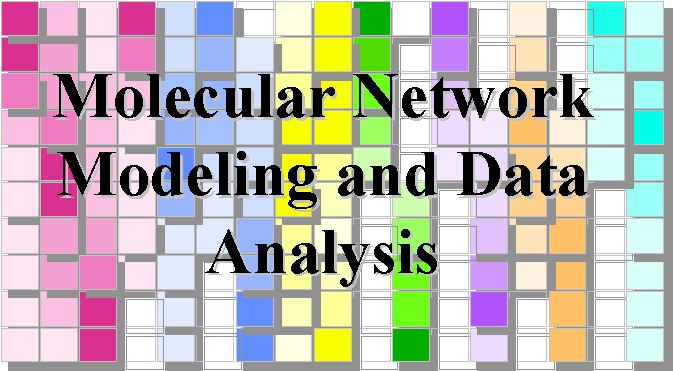

Advances in analytical and computational technologies are driving the transition to a systems biology that deals with the integrated behavior of biomolecular networks. As the volume of biological activity data (mRNA, protein, metabolite concentrations and localization) is progressively growing, we need to develop the conceptual frameworks and computational tools that will allow us to manage the data and extract meaning from it. This process can be organized into a series of steps: 1) Prerequisite statistical assessment of data quality, precision and reproducibility 2) Grouping of data into categories - cluster analysis, pathway inference 3) Inference of causal relationships from state transition data - analysis of perturbation responses and time series, "reverse engineering" 4) Predictive modeling - continuous and discrete network models, prediction of temporal and spatial activity patterns, discovery of principles of network organization We anticipate that a successful integration of experimental biology with advanced computational technologies will allow us to discover key biological control processes relevant to therapeutics and bioengineering.
We encourage academic, government and industrial scientists to submit manuscripts on computational methods for the analysis, modeling and visualization of biomolecular networks. Emphasis should be given on how these methods impact the analysis and design of biological experiments. Data sets are now becoming available on mRNA, protein, and metabolite concentrations and localization, providing a growing experimental foundation for the construction of models. Topics include, but are not limited to:
PSB2000 will publish accepted full papers in an archival Proceedings. All contributed papers will be rigorously peer-reviewed by at least three referees. Each accepted full paper will be allocated up to 12 pages in the conference Proceedings. A limited number of papers will be selected for a 30-minute oral presentation to the full assembled conference. Accepted poster abstracts will be distributed at the conference separately from the archival Proceedings. To be eligible for Proceedings publication, each full paper must be accompanied by a cover letter stating that it contains original unpublished results not currently under consideration elsewhere.
All one page abstracts for posters should be submitted by Nov. 1. Please send electronically (in plain ascii text or as a Microsoft Word file) to: altman@smi.stanford.edu.
Full papers can be submitted before July 13 by email to Russ Altman at altman@smi.stanford.edu. Format requirements for electronic submission will be available on the web page (http://psb.stanford.edu) or from Russ Altman.
Roland Somogyi, Incyte Pharmaceuticals, Inc. (rsomogyi@incyte.com)
Hiroaki Kitano, Sony Computer Science Laboratory (kitano@csl.sony.co.jp)
Miyano Satoru, University of Tokyo (miyano@ims.u-tokyo.ac.jp)
Qiang Zheng, Scios Inc. (zheng@sciosinc.com)
Q1. How can my paper be included in PSB's hardbound proceedings?
PSB publishes peer-reviewed full papers in an archival proceedings. Each accepted paper will be allocated 12 pages in the proceedings volume. Paper authors are required to register (and pay) for the conference by the time they submit their camera-ready copy, or the paper will not be published.
Q2. How does a PSB publication compare to a journal publication?
PSB papers are strenuously peer reviewed, and must report significant original material. PSB expects to be included in Indicus Medicus, Medline and other indexing services starting this year. All accepted full papers will be indexed just as if they had appeared in a journal. It is too early to assess the impact of a PSB paper quantitatively, but we will take every action we can to improve the visibility and significance of PSB publication.
Q3. If I do not want to submit a full paper to PSB, but wish to participate?
Authors who do not wish to submit a full paper are welcome to submit one page abstracts, which will be distributed at the meeting separately from the archival proceedings, and are also welcome to display standard or computer-interactive posters.
Q4. How can I obtain travel support to come to PSB?
We have been able to offer partial travel support to many PSB attendees in the past, including most authors of accepted full papers who request support and many graduate students. However, please note that NO ONE IS GUARANTEED TRAVEL SUPPORT. Travel support applications will be available on the web site soon. (http://psb.stanford.edu).